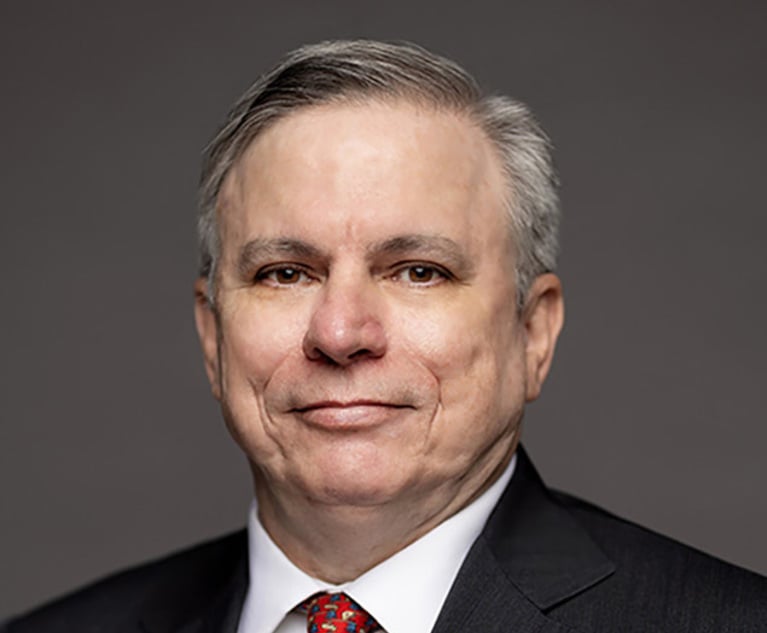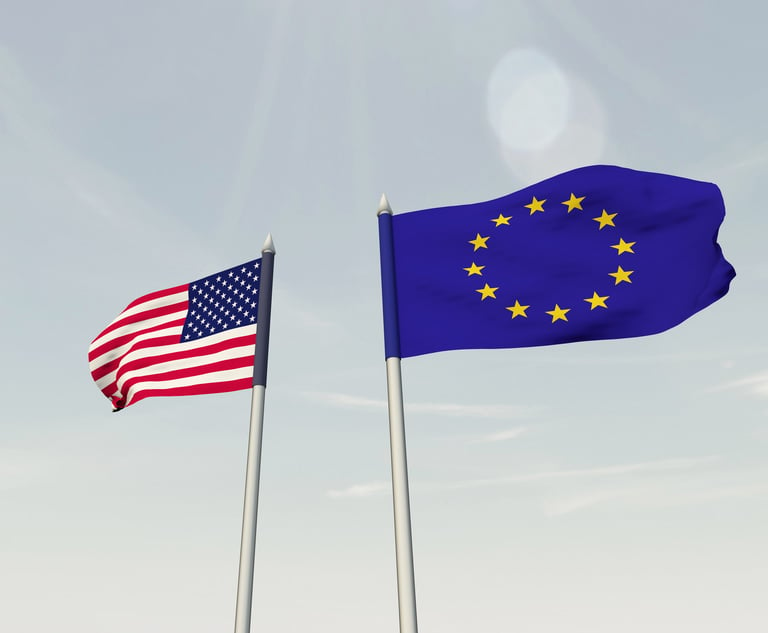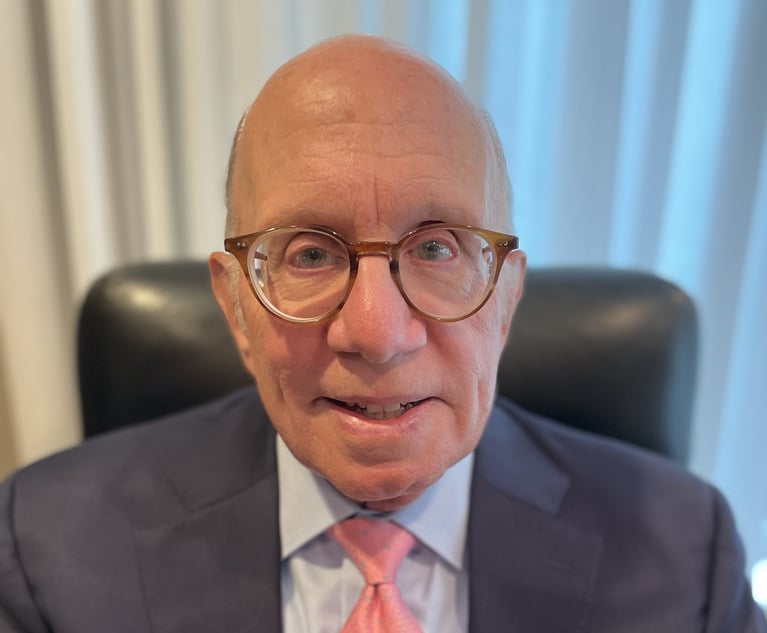 Joel Cohen
Joel CohenProsecuting George Floyd's Killing: A Timing Calculated to Keep the Peace?
In his Ethics and Criminal Practice column, Joel Cohen looks at the charges brought against the police officers in the George Floyd case.
June 10, 2020 at 12:45 PM
6 minute read
The rubble, not merely the dust, has begun to settle. This has never happened before in America. Locally maybe, but even the Rodney King riots were nothing like this, even within California. Never before have we seen this level of looting and sometimes violent confrontation over a police killing (even if at the hand of opportunistic outside agitators, as widely reported). It erupted across the major cities in the country, and in the smaller communities. And indeed, the price for the Floyd killing and what stemmed from it is clear: virtually every American—perhaps a few police union chiefs aside — wanted all four police officers immediately charged with crimes for George Floyd's murder. Nothing short, nothing later, would do!
Why? Is it because Americans have finally seen the light of day—that racial intolerance by police was simply no longer acceptable? Was it because everyone was so horrified by the (obviously) depraved indifference for basic human rights that maximum murder charges were essential? Or was it that so many simply feared that if maximum charges weren't brought, and immediately, that the looting (and violence) would continue, along with curfews? And, equally important, a fear by many that the police would be unwilling to continue to risk their own safety on the streets of America.
This all sounds cynical. Cynical that the arrest of all four police officers for crimes charging murder and aiding murder were made to happen so quickly after the eruption began. But Derek Chauvin was charged within three days of the murder, and the others (and Chauvin's charges escalated) within nine. Hardly an inordinate period of time for a crime of this magnitude where there was no realistic concern that the suspects would take off for Bolivia, or repeat their crime given their immediate firing. Was this, then, in response to the Floyd family lawyer's (easily explainable) desire that these charging actions had to be taken before a Floyd memorial set for June 4?
With a whole nation watching and protesting—multiracial, indeed—any prosecutor with an ounce of common sense would be drawn and motivated by the absolute need to "rush" his judgment if only to puncture the balloon of dangerous confrontation that was spreading nationwide. Indeed, those still grieving over Floyd's loss viscerally felt that the Hennepin County Attorney had dragged his feet when he didn't charge the four police officers for murder literally the morning after. Law enforcement, however, shouldn't be required to act that way—to scamper to charge offenders because street violence will occur if it doesn't, even though he likely required more time "to get it just right." It's simply untenable even if, as it appears, that it is absolutely proper, indeed righteous, to prosecute them all.
County Attorney Michael Freeman alluded to concerns he was facing regarding at least some potential charges when he still had complete responsibility for the case. He presumably tried to manage expectations when, at his confrontational press conference, he (oddly) stated that some evidence he had obtained was exculpatory and tended to negate any murder charges, and more time was necessary. He may have recognized that, while the three police officers were hardly innocent bystanders and could easily have intervened to save Floyd's life, there might conceivably be significant legal problems in convicting at least some of them for "aiding murder."
The response to Freeman, particularly by the black community in Minneapolis, was swift, and fierce. Indeed, Minnesota legislators wrote to Governor Tim Waltz: "Unfortunately, our constituents, especially constituents of color, have lost faith in the ability of … Freeman to fairly and impartially investigate and prosecute these cases. Freeman's press conference on May 28th, in which he seemed ill-prepared and suggested that there was unseen exculpatory evidence that might exonerate the officers, further ruptured this trust." In response, Governor Waltz announced that Attorney General Keith Ellison would take over the case.
And with that, AG Ellison, too, laid out what he called a "dose of reality." "Prosecuting police officers for misconduct, including homicide and murder is very difficult. And if you look at the cases that have been in front of the public over the last many years you will see that that is true …. We need to make sure we are absolutely prepared. We want to let the pubic know we are pursuing justice, we are pursuing trust … we are pursuing accountability." Wasn't he right?
Still, Ellison, too, was under the gun, and he knew it. June 4 was coming, and, lest there truly be any doubt about it, he knew he needed to charge everyone, and quickly. Yes, Attorney General Ellison recognized potential evidentiary difficulties with the case. Nonetheless, he charged all four three days after having been assigned it. So, Ellison didn't really have a choice, even if he likely saw problems in his endeavor regarding the legal sufficiency of some of the counts. Surely, any grieving family survivor would want everyone prosecuted on maximum charges. Nonetheless, neither family members, nor the public nor newspaper editorialists can be allowed to dictate the timing of a prosecutor's charging decisions, no matter how horrible the crime in question.
The overwhelming response to the viral videotape has led to a rapid and robust prosecutorial response. And, of course, the outpouring demand for "Justice for George" may, hopefully, have become a turning point for criminal justice reform, especially for black and brown people in America. Convictions here will go a long way to that end.
Still, let's also hope that America never again has to endure what befell it these past weeks in order for justice to be pursued. Prosecutors aren't typically at their best in carrying out their vital and sober duties when editorial opinions, public reaction and street protest (sometimes gone awry) take a heavy hand that virtually "compels" precisely when critical charging actions must be taken. That is, even if the opinion on the street is absolutely right on the merits!
Joel Cohen, a former state and federal prosecutor, practices white collar criminal defense law as senior counsel at Stroock & Stroock & Lavan. He is an adjunct professor at both Fordham and Cardozo Law Schools and the author of "I Swear: The Meaning of An Oath" (Vandeplas Publ. 2019).
This content has been archived. It is available through our partners, LexisNexis® and Bloomberg Law.
To view this content, please continue to their sites.
Not a Lexis Subscriber?
Subscribe Now
Not a Bloomberg Law Subscriber?
Subscribe Now
NOT FOR REPRINT
© 2024 ALM Global, LLC, All Rights Reserved. Request academic re-use from www.copyright.com. All other uses, submit a request to [email protected]. For more information visit Asset & Logo Licensing.
You Might Like
View All
Why Is It Becoming More Difficult for Businesses to Mandate Arbitration of Employment Disputes?
6 minute read
European, US Litigation Funding Experts Look for Commonalities at NYU Event
Law Firms Mentioned
Trending Stories
- 1Gibson Dunn Sued By Crypto Client After Lateral Hire Causes Conflict of Interest
- 2Trump's Solicitor General Expected to 'Flip' Prelogar's Positions at Supreme Court
- 3Pharmacy Lawyers See Promise in NY Regulator's Curbs on PBM Industry
- 4Outgoing USPTO Director Kathi Vidal: ‘We All Want the Country to Be in a Better Place’
- 5Supreme Court Will Review Constitutionality Of FCC's Universal Service Fund
Who Got The Work
Michael G. Bongiorno, Andrew Scott Dulberg and Elizabeth E. Driscoll from Wilmer Cutler Pickering Hale and Dorr have stepped in to represent Symbotic Inc., an A.I.-enabled technology platform that focuses on increasing supply chain efficiency, and other defendants in a pending shareholder derivative lawsuit. The case, filed Oct. 2 in Massachusetts District Court by the Brown Law Firm on behalf of Stephen Austen, accuses certain officers and directors of misleading investors in regard to Symbotic's potential for margin growth by failing to disclose that the company was not equipped to timely deploy its systems or manage expenses through project delays. The case, assigned to U.S. District Judge Nathaniel M. Gorton, is 1:24-cv-12522, Austen v. Cohen et al.
Who Got The Work
Edmund Polubinski and Marie Killmond of Davis Polk & Wardwell have entered appearances for data platform software development company MongoDB and other defendants in a pending shareholder derivative lawsuit. The action, filed Oct. 7 in New York Southern District Court by the Brown Law Firm, accuses the company's directors and/or officers of falsely expressing confidence in the company’s restructuring of its sales incentive plan and downplaying the severity of decreases in its upfront commitments. The case is 1:24-cv-07594, Roy v. Ittycheria et al.
Who Got The Work
Amy O. Bruchs and Kurt F. Ellison of Michael Best & Friedrich have entered appearances for Epic Systems Corp. in a pending employment discrimination lawsuit. The suit was filed Sept. 7 in Wisconsin Western District Court by Levine Eisberner LLC and Siri & Glimstad on behalf of a project manager who claims that he was wrongfully terminated after applying for a religious exemption to the defendant's COVID-19 vaccine mandate. The case, assigned to U.S. Magistrate Judge Anita Marie Boor, is 3:24-cv-00630, Secker, Nathan v. Epic Systems Corporation.
Who Got The Work
David X. Sullivan, Thomas J. Finn and Gregory A. Hall from McCarter & English have entered appearances for Sunrun Installation Services in a pending civil rights lawsuit. The complaint was filed Sept. 4 in Connecticut District Court by attorney Robert M. Berke on behalf of former employee George Edward Steins, who was arrested and charged with employing an unregistered home improvement salesperson. The complaint alleges that had Sunrun informed the Connecticut Department of Consumer Protection that the plaintiff's employment had ended in 2017 and that he no longer held Sunrun's home improvement contractor license, he would not have been hit with charges, which were dismissed in May 2024. The case, assigned to U.S. District Judge Jeffrey A. Meyer, is 3:24-cv-01423, Steins v. Sunrun, Inc. et al.
Who Got The Work
Greenberg Traurig shareholder Joshua L. Raskin has entered an appearance for boohoo.com UK Ltd. in a pending patent infringement lawsuit. The suit, filed Sept. 3 in Texas Eastern District Court by Rozier Hardt McDonough on behalf of Alto Dynamics, asserts five patents related to an online shopping platform. The case, assigned to U.S. District Judge Rodney Gilstrap, is 2:24-cv-00719, Alto Dynamics, LLC v. boohoo.com UK Limited.
Featured Firms
Law Offices of Gary Martin Hays & Associates, P.C.
(470) 294-1674
Law Offices of Mark E. Salomone
(857) 444-6468
Smith & Hassler
(713) 739-1250








